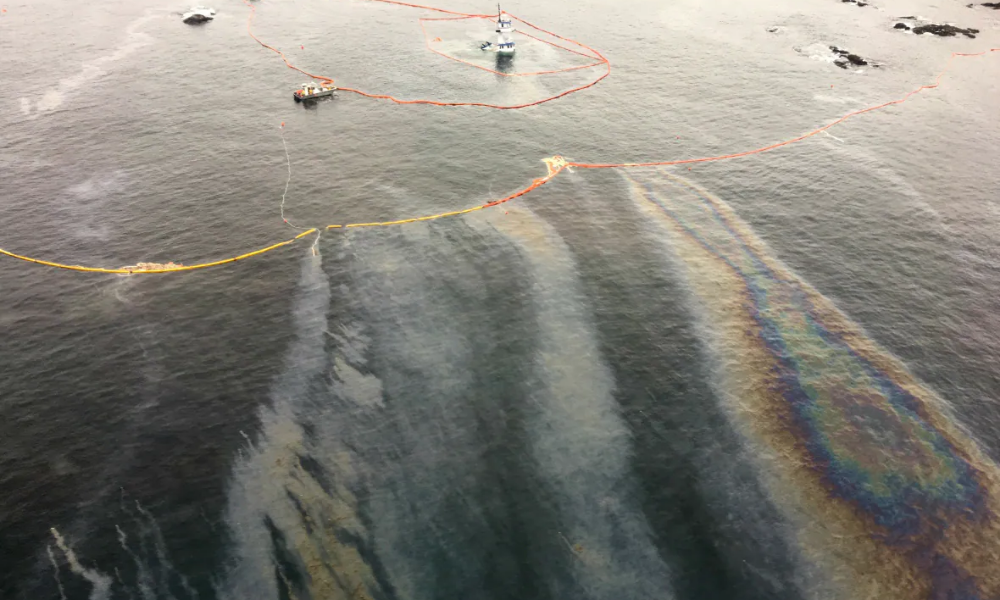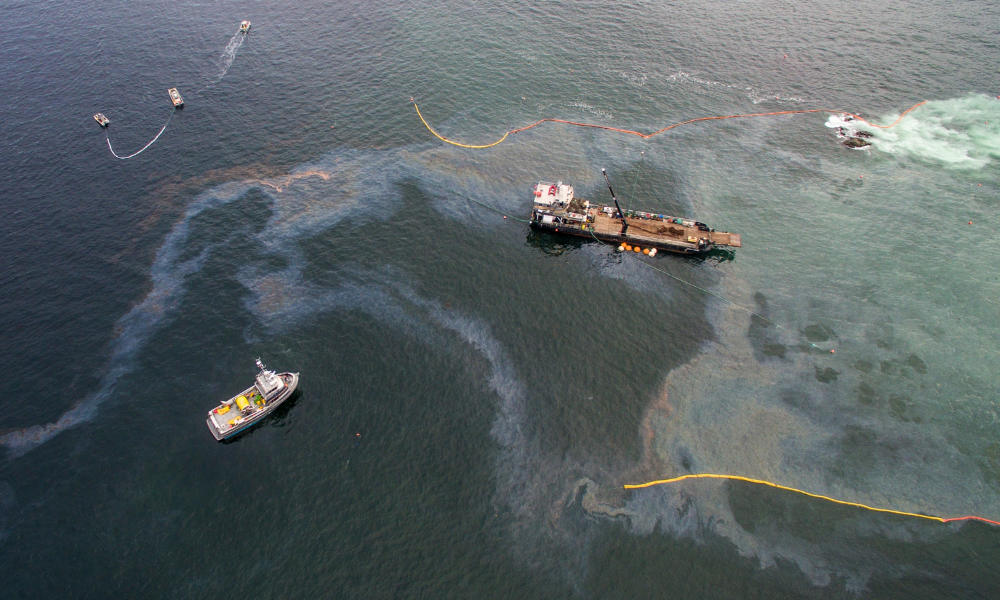Compared to standard instruments in various Canadian aquatic ecosystems, the Oil Spill Response Challenge will create new and readily deployable methods to efficiently identify oil spills, improve response time, or raise the oil spill recovery rate. The Challenge is crucial because it will extend the range of accessible oil spill response solutions for use in Canadian marine and freshwater ecosystems, which is in line with the recommendations of the Canada Energy Regulator.
It is enlisting the help of entrepreneurs to accelerate the development and deployment of new oil spill response systems. It will significantly improve Canada’s ability to protect its freshwater and marine resources from oil spills.
Challenge Objectives & Assessment Criteria
Natural Resources Canada (NRCan) is inviting innovators to submit proposals for technological solutions that:
- Can increase the effectiveness of oil spill response by lowering the time it takes to discover oil spilled in water and increasing the amount of oil spilled in water recovered;
- Are innovative and disruptive to the current quo: the design provides practical solutions for oil spill detection and recovery compared to traditional procedures.
- Are suitable to the Canadian context: solutions used in various habitats and situations across the country, such as the operating environment, oil type, challenging conditions, and scalability.
- Reduce negative environmental consequences and improve community safety: top priorities are minimizing negative environmental impacts and increasing marine safety.
- The operational efficacy and practicality of solutions for end-users, including logistics and resource requirements, are ready to use. The solution’s deployment is safe, realistic, and feasible.
- Have a solid plan to scale to market: innovators know their market, have the right relationships and have a strategy to scale their technology for deployment.
Challenge Streams
Stream 1: Improved Detection Technologies
The goal is to speed up the development of innovative solutions that reduce the time between starting an oil spill in fresh or saltwater and its detection, reduction, and elimination. The amount and quality of oil spill-related data collected and aggregated to inform spill response have dramatically increased.
Detection refers to any technologies used to detect, gather, and analyze data to make prompt, evidence-based decisions during an oil spill emergency response. The detection stream expects solutions to accomplish at least one of the following outcomes:
- Oil leak detection in real-time
- Collect / model oil spill data such as the spill’s spatial extent (width and depth), estimate the magnitude of the release, the release rate, and determine the composition of the spilled oil and water salinity (for estuarine environments), or a combination of these capabilities.
- Provide a data analytics system that enables the gathering, consolidation, and analysis of data relevant to an oil spill response, such as weather data, oil spill data (as mentioned above), and the position of emergency response crews.
Surface (i.e., satellite, aircraft, glider, other remote sensing technologies, etc.) and subsurface (i.e., autonomous or human-crewed underwater vehicles, etc.) sensors, laboratory analytical methods transferrable to spill responders, AI, computer modeling, and data analytics products to aggregate data sets necessary to inform response during and after an oil spill are all examples of this.
Cloud cover, isolated or difficult-to-access sites, and pipelines submerged in water are just some of the challenges innovators should consider customizing their technology to overcome.
Stream 2: Recovery-Improving Technologies
Purpose: Increase and expedite the recovery of oil spilled into Canada’s various aquatic habitats by accelerating the development and deployment of novel solutions.
Recovery encompasses a wide range of methods that can be used to recover oil to the greatest extent possible, reducing the quantity of the oil that pollutes marine areas. Innovative adaptations to traditional containment and mechanical recovery technologies (e.g., skimmers, booms), chemical treatment, and alternative response measures (e.g., spill treating agents, herders, in-situ burning, surface washing agents, advanced sorbents), and biodegradation treatments suitable for marine and freshwater environments are just a few examples of possible solutions.
Oil kind (light, medium, heavy), the salinity of water, turbulence, immersed or sunken oil, ice or frozen seas, and distant places are the challenges that innovators are encouraged to explore adjusting their methods to address.
Challenge Structure
Successful applications will go through an evaluation and selection process to gain access to financial and non-financial incentives at each challenge step. The Challenge is divided into three stages:
Stage 1: Proposed Concept – Three Months / Ten Semi-finalists Selected
Applicants must make an online submission detailing their concept during the first stage of the Challenge. You must demonstrate a grasp of the problem you attempt to tackle in your application. It should include a proposed proof of concept for your solution design and a detailed explanation of how it satisfies the Challenge’s objectives and assessment criteria.
Stage 2: Prototype Incubation & Development – Approximately 10 Months / 5 Finalists Selected
During this round, ten semi-finalists will be needed to design, develop, and validate a prototype of your solution by carrying out your project plans and using an experimental approach to test and evaluate its effectiveness. Teams will be required to test and evaluate their solutions rigorously by measuring and reporting against evaluation criteria. Projects that have partnerships and collaborations with end-users to assist future implementation will be given priority consideration.
Teams should have achieved or exceeded Level 4 of the Technology Readiness Level scale by the end of this stage.
Stage 3: Early-stage Demonstration – 12 months or less / 1 Winner Selected
The five finalists will be needed to accelerate and scale up prototypes to a level acceptable for pilot testing or demonstration at an appropriate testing facility and demonstrate a clear business plan for bringing your product to market in an operational environment at this stage. You’ll be expected to keep track of your solution’s progress and thoroughly test and evaluate its efficacy by measuring and reporting against assessment criteria.
By the end of this stage, all finalists should have tested their prototype in a simulated operational setting or laboratory and reached or exceeded Level 6 of the Technology Readiness Scale.
Eligibility
Commercial and non-commercial organizations and people registered to do business in Canada are eligible to enter the Oil Spill Response Challenge.
The following are examples of Challenge applicants who are eligible:
- Businesses or other for-profit organizations;
- Not-for-profit organizations;
- Indigenous organizations and groups located in Canada;
- Post-secondary/academic institutions;
- Individual or group of individuals;
- International individuals and entities.*
* A legal entity in Canada is required, or a partnership with one is required.
Prizes
- Ten semi-finalists will be chosen to win up to $300,000 in funding to help them build their technology prototype.
- Five finalists with the best ideas will be chosen for up to $1 million in extra funding to help them scale and demonstrate their technology.
- The most demonstrated technology team will get a $2 million grand prize.
How to Make an Application?
These application instructions are for Stage 1 of the Challenge’s Detection and Recovery Streams.
Only applications submitted through the authorized Challenge application portal on the Impact Canada website will be accepted. Applications must be submitted through the site by 11:59 p.m. Pacific Time on June 1, 2022.
The challenge website has additional information, such as the process, dates, particular deadlines, awards, and Frequently Asked Questions (FAQs).
Applicants must complete and submit the following materials online before the challenge website’s closing date and time to be eligible for the Challenge. The following items make for a comprehensive application package:
- Challenge Application Form
- Applicant Details (mandatory)
- Proposed Solution Details (mandatory) and Supporting Material
- Visual representations of the solution (mandatory)
- Preliminary data or calculations (optional)
- Existing articles of incorporation (optional)
- Letters of recommendation (optional)
- Declaration (mandatory)
- Survey (optional)
The Process of Selection
To assist in examining applications, Natural Resources Canada will convene a review committee of public and private sector subject matter experts (e.g., private sector representatives, stakeholder groups, and oil spill response regime specialists). The review committee will review the submissions and provide recommendations to help Natural Resources Canada select semi-finalists, finalists, and winners. The review process will be aided by Natural Resources Canada’s and the federal government’s experience.
Natural Resources Canada will take the appropriate steps to ensure that review committee members and anyone involved in the assessment process do not have any conflicts of interest and sign non-disclosure agreements to preserve applicants’ information. Natural Resources Canada will choose and announce the semi-finalists, finalists, and winners based on the review committee’s recommendations for each Challenge round. Natural Resource Canada’s final judgments and selections cannot be challenged.
Please keep in mind that even if a solution meets all eligibility and assessment criteria, applying does not obligate the Minister or officials from Natural Resources Canada to fund the proposed project. The Minister retains the authority to decide whether or not an application will be funded.
Application Deadline:
The deadline for applications is June 1, 2022, at 11:59 p.m. Pacific Time.








Leave a Reply